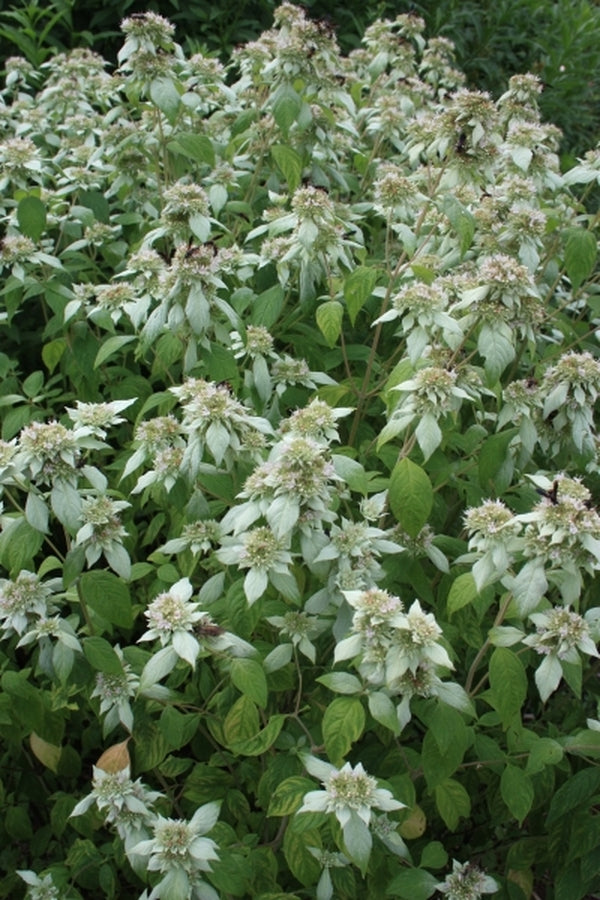Pycnanthemum loomisii Campbell Co. TN
Loomis' Mountain Mint
This plant is not currently for sale. This is an archive page preserved for informational use.
Shop Available PycnanthemumItem #: 9677
Zones: 6a to 8b, at least
Dormancy: Winter
Height: 54" tall
Origin: United States
Pot Size: 3.5" pot (24 fl. oz/0.7 L)
Pycnanthemum loomisii is a little known native mountain mint that hails from Illinois south to Florida. Our offering is from an Aaron Floden accession in Campbell Co., Tennessee. For us, Pycnanthemum loomisii has formed a 4.5' tall x 4.5' wide patch of sturdy stalks of peppermint-scented, grey-green foliage in 3 years. Compared to many of the highly aggressive, running mountain mints, Pycnanthemum loomisii plays well with others...as long as you give it enough room. Loomis' mountain mint tops out at 4.5' tall for us in late June, when the upper leaves turn bright silver and are adorned with the tiny pink-lavender terminal flowers. The number of cool insects that it attracts to the garden is truly amazing!
Maintenance:
Cut last year's stems to the ground before new growth starts in spring, or whenever they get shabby or you tire of their presence. Generally the seed heads remain attractive all winter. This is all it requires in the way of maintenance.
Of the 20 species of Pycnanthemum, some are clump forming, others are spreading. The clump forming species are suitable even to a small sunny garden. The spreading Mountain Mints are perhaps better suited to larger gardens where larger masses of ground covering plants are desired.
Growing Conditions:
Sun to part sun is best both for flowering and the pollinators which flock to the flowers. Average soil conditions are preferred.
Garden Value:
The Mountain Mints are superb supporters of a wide range of pollinating insects, especially so for many species are in bloom for several months. Beyond the importance of supporting pollinators there is the shear joy and entertainment of watching a wide range of insects working these flowers; a veritable Serengeti Plains in a few square feet of ones garden. They are attractive in bloom as well as in their winter forms and are usually avoided by deer and rabbits.
Natural Impact:
Include in any sunny garden where one hopes to support pollinating insects.

-
Other Attributes
Genus: Pycnanthemum
Flower Color: White/Cream
Bloom Time: Summer
Container Role: Thrillers
Garden Themes: Cottage Garden Plants , Green Roofs , Living Wall , White Garden
Other: Fragrant Foliage Plants , Edimentals , Cut Flower Plants , Deer Resistant Plants , Drought Tolerant Plants , Georgia native plants , Pollinator Plants , North American Native Plants , Xeriscaping Plants , United States Native Plants

